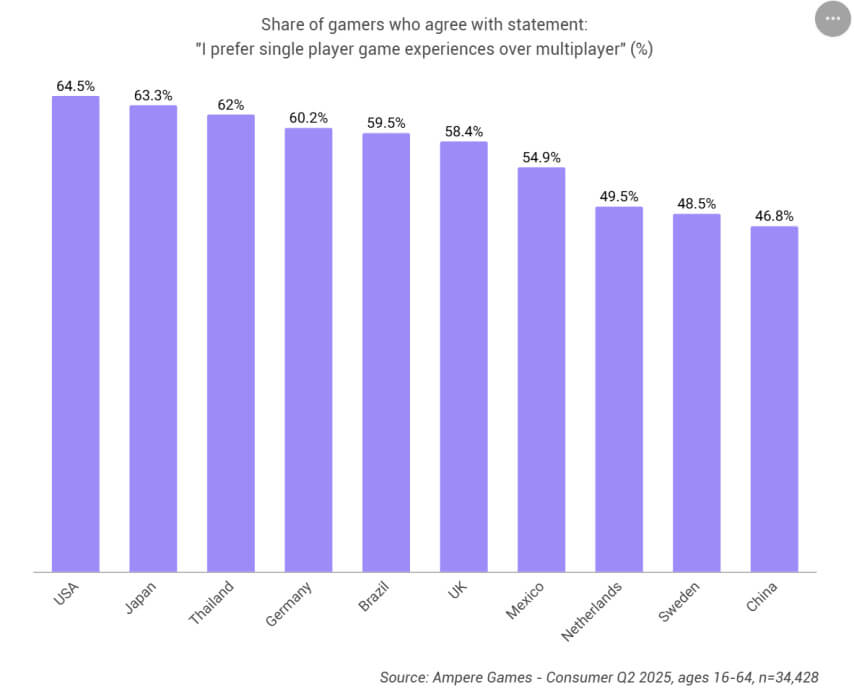As many video game publishers continue to desperately push multiplayer-oriented live service games, often in ways that end in disaster, it turns out that most players still prefer single-player experiences. Who would have thought? To be specific, a new survey from Ampere Analysis measured responses from 34,000 gamers across 22 markets and found that 56% of them favored single-player.
This preference was relatively consistent across gender, with 55% of male gamers and 58% of female players preferring to play alone. However, there were differences among age demographics, with 49% of Gen Z (16 to 24) favoring single-player games versus 56% of Millennials (25 to 34). In some ways, this isn’t surprising, as forever games like Fortnite came into popularity when much of Gen Z was first getting into gaming.
Some of the biggest differences in preference come from regional divides, as the above graph from Ampere Analysis indicates. The U.S. was the country most interested in single-player games, with an impressive 64.5% favoring them, while China had the lowest at 46.8%. While I’m a little surprised that the U.S. has the largest preference for single-player games, given how many game studios in America have pivoted towards multiplayer, China has been previously described as having the largest number of esports players in the world and the largest esports audience, so this tracks to some extent.
Overall, despite it feeling like every game publisher is trying to make the next multiplayer hit, the average preference for single-player games has actually increased over the last four years by 4%. It’s possible that this uptick is an adverse reaction to companies falling over backward to produce the next infinite treadmill that monopolizes players’ time, and most importantly, their money. However, for every Fortnite, there are many more Battleborns, a phenomenon that results in wasted potential and studio closures.
Concord was the epitome of this trend, a game that reportedly lost at least $200 million before Sony shut it down only a few weeks later. Of course, as Sony was throwing money into this sacrificial live-service pit, it had recently closed the acclaimed Japan Studio, which was behind single-player games like Shadow of the Colossus, Gravity Rush, Ape Escape, Astro Bot, Siren, and many more.
This isn’t to disparage the people who worked on Concord, but more to point out that Sony’s desire to produce the next multiplayer hit cost them hundreds of millions with little to show for it besides many talented people looking for jobs.
These live-service games are a huge bet, as they usually take a long time to develop. However, the very rare hits can buoy an entire publisher, which is the kind of gamble that shareholders and CEOs love to take before gliding away with a golden parachute. It’s only hundreds or thousands of other people’s jobs that are on the line, after all.


 Keep scrolling for more great stories.
Keep scrolling for more great stories.
